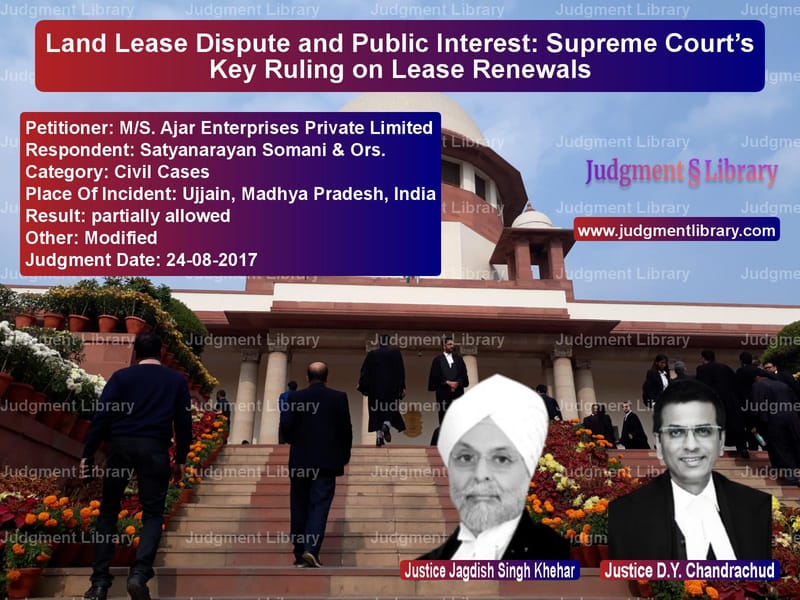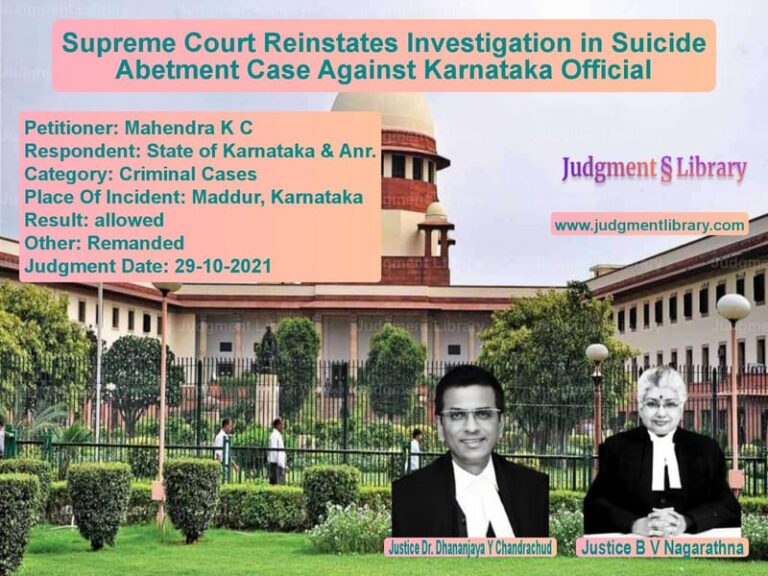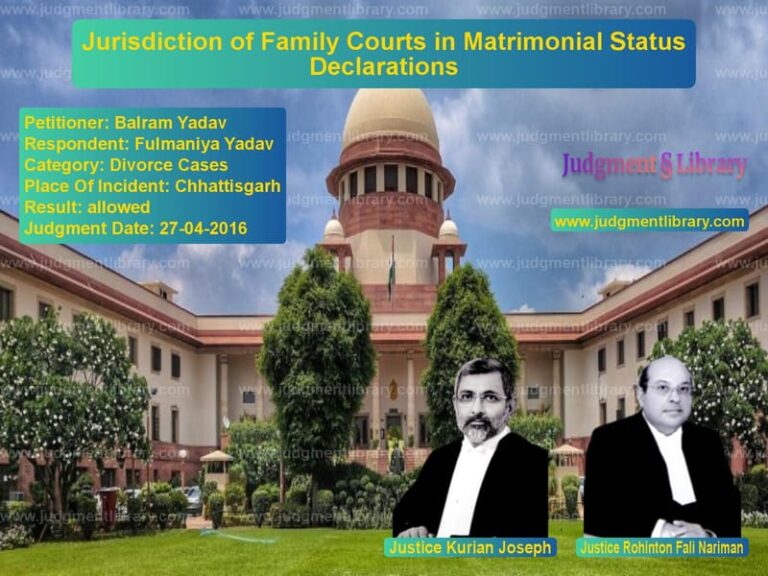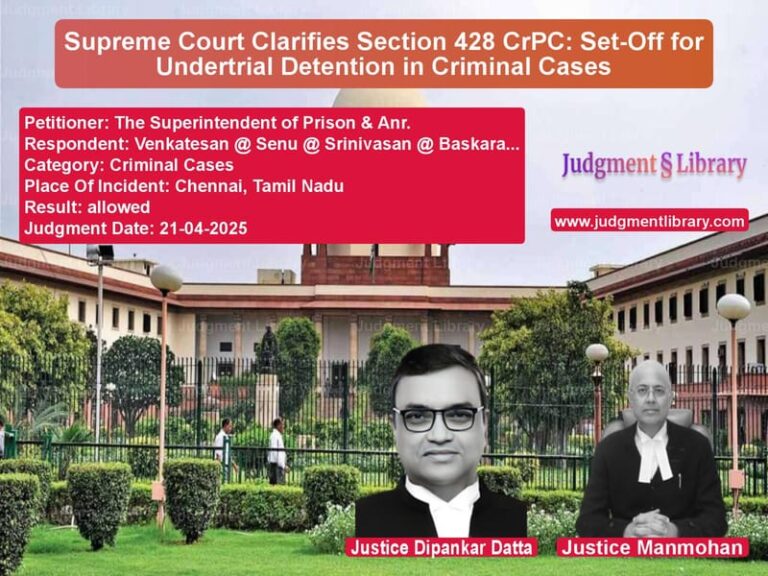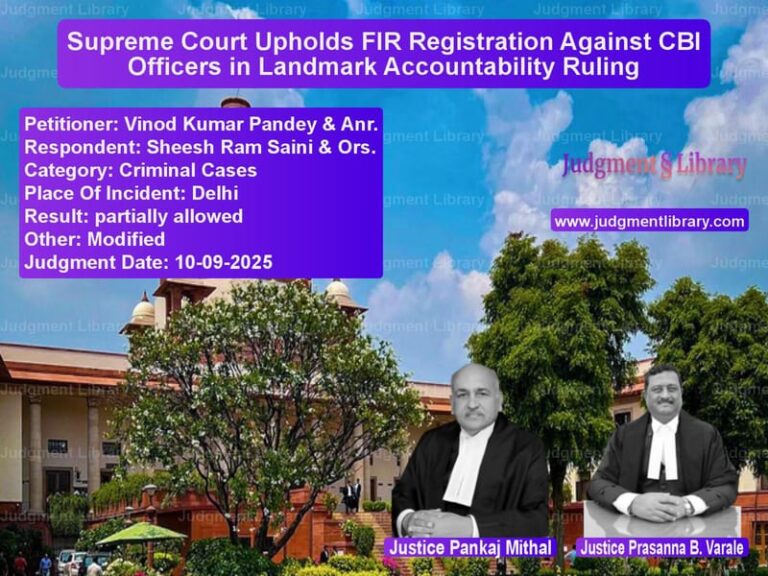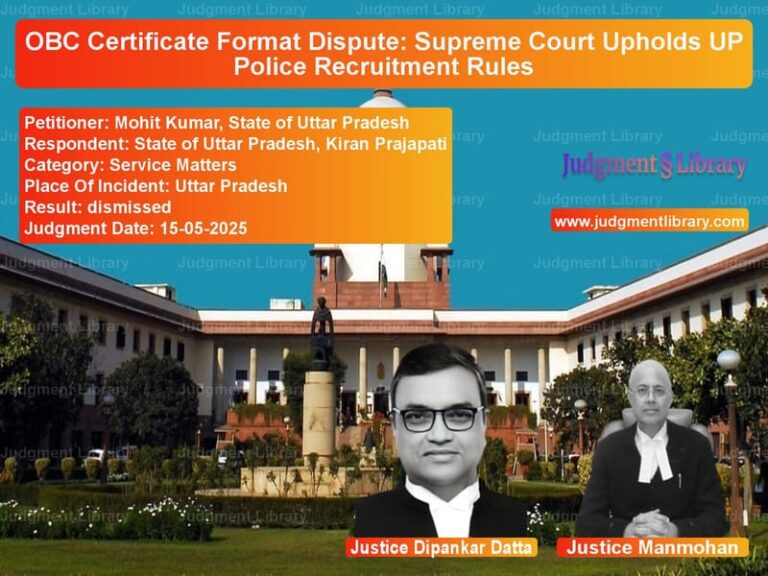Land Lease Dispute and Public Interest: Supreme Court’s Key Ruling on Lease Renewals
The case of M/S. Ajar Enterprises Private Limited vs. Satyanarayan Somani & Ors. is a crucial Supreme Court ruling addressing lease renewals, public interest, and the role of state authorities in the management of leased land. The dispute involved the renewal of a lease granted by the Ujjain Development Authority (UDA) and the conversion of the leased land into freehold property. The Supreme Court’s judgment clarified whether such transactions should be subject to public auction or could be renewed based on the original lease terms.
The Madhya Pradesh High Court had earlier ruled that the lease renewal and land conversion were flawed, leading to a loss of public revenue. The Supreme Court upheld the High Court’s ruling but provided relief to third-party buyers who had entered into valid sale transactions.
Background of the Case
The appellant, M/S Ajar Enterprises Private Limited (Ajar), challenged a judgment by the Madhya Pradesh High Court, which had set aside the renewal of a lease granted by UDA for 30 years, directing that possession of the land be taken back and the land be put to a public auction. The dispute centered around a 43,407 square meter plot originally leased to IISCO Stanton Pipe & Foundry Company Ltd. (IISCO) in 1985 for residential development.
Following IISCO’s liquidation, the leasehold rights were sold by the Official Liquidator under the direction of the Calcutta High Court. Ajar obtained these leasehold rights and later sought renewal. UDA renewed the lease and later converted it into freehold property, which was then sold for private development. This led to public interest litigation, challenging the legality of the renewal and conversion.
Key Legal Issues
- Whether the renewal of the lease was valid under the original terms.
- Whether UDA was required to auction the land instead of renewing the lease.
- Whether converting the land to freehold violated public interest principles.
- The extent to which third-party purchasers should be protected.
Arguments by the Petitioner (Ajar Enterprises)
Ajar contended that:
- The lease renewal was valid under the original terms, which provided for extensions.
- UDA followed a government policy allowing conversion of leasehold lands to freehold.
- The renewal and conversion were consistent with state policies.
- The company had invested significant amounts in developing the land and selling plots.
- Public auction was not mandatory under the law.
Arguments by the Respondents
The respondents, including public interest litigants, argued that:
- The original lease did not confer an automatic right of renewal.
- UDA had an obligation to auction the land to ensure maximum revenue for the public.
- By granting the lease renewal at a nominal premium, UDA conferred undue benefits to a private developer.
- The conversion of leasehold land to freehold without auction violated public interest.
- The renewal process lacked transparency.
Supreme Court’s Judgment
The Supreme Court, in a detailed ruling delivered by Chief Justice Jagdish Singh Khehar and Justice Dr. D.Y. Chandrachud, upheld the High Court’s decision but modified its directions to protect third-party buyers.
1. Lease Renewal Not an Absolute Right
The Court ruled that the renewal clause in the original lease did not provide an automatic right of renewal. The clause merely stated that the lease ‘could’ be renewed, not that it ‘must’ be renewed. UDA had discretion, which it failed to exercise in public interest.
“There was no absolute or indefeasible right of renewal. The clause for renewal provided that the lease could be renewed, not that it must or shall be renewed.”
2. Public Auction Should Have Been Considered
The Court held that UDA, as a public authority, had a duty to ensure that public resources were allocated in a manner that maximized revenue and served public interest. Since the lease was for a large tract of land in a prime location, UDA should have considered auctioning the land instead of renewing the lease at a lower rate.
3. Conversion to Freehold Was Unjustified
The Court ruled that the conversion of the land from leasehold to freehold was unjustified because it resulted in an undue benefit to a private developer. The conversion should have followed a competitive process.
4. Third-Party Purchasers Protected
The Court provided relief to third-party buyers who had purchased plots before the High Court ruling, stating:
“Third-party purchasers who entered into registered sale transactions prior to the High Court’s judgment shall not be disturbed. However, those with mere agreements to sell shall be refunded their money with interest.”
Key Takeaways from the Judgment
- Public authorities must act in the best interest of revenue generation when managing public land.
- Lease renewal is not an absolute right and must be examined based on contemporary market conditions.
- Government entities cannot confer an undue advantage on private entities at the cost of public revenue.
- Third-party purchasers who made legitimate investments should be protected.
Impact of the Judgment
This ruling has set a precedent for the renewal and conversion of public land leases. It emphasizes transparency in public asset management and reinforces the need for government bodies to ensure fair returns on public land.
The decision ensures that public land is not converted to private assets without competitive processes, protecting government revenue and preventing undue benefits to private developers.
Conclusion
The Supreme Court’s ruling in M/S Ajar Enterprises Private Limited vs. Satyanarayan Somani & Ors. reinforces the principles of fairness, transparency, and public interest in state land management. By striking down the improper lease renewal and conversion while protecting bona fide purchasers, the judgment ensures a balance between government accountability and investor protection.
Don’t miss out on the full details! Download the complete judgment in PDF format below and gain valuable insights instantly!
Download Judgment: MS. Ajar Enterprise vs Satyanarayan Somani Supreme Court of India Judgment Dated 24-08-2017.pdf
Direct Downlaod Judgment: Direct downlaod this Judgment
See all petitions in Landlord-Tenant Disputes
See all petitions in Property Disputes
See all petitions in Contract Disputes
See all petitions in Judgment by Jagdish Singh Khehar
See all petitions in Judgment by Dhananjaya Y Chandrachud
See all petitions in partially allowed
See all petitions in Modified
See all petitions in supreme court of India judgments August 2017
See all petitions in 2017 judgments
See all posts in Civil Cases Category
See all allowed petitions in Civil Cases Category
See all Dismissed petitions in Civil Cases Category
See all partially allowed petitions in Civil Cases Category

